Once Upon a Time in China Blu-ray Movie
HomeOnce Upon a Time in China Blu-ray Movie 
黃飛鴻 / Wong fei hung | Eureka ClassicsEureka Entertainment | 1991 | 134 min | Rated BBFC: 15 | No Release Date
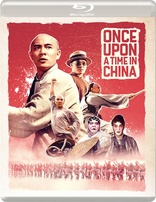
Price
Movie rating
7 | / 10 |
Blu-ray rating
| Users | 0.0 | |
| Reviewer | 4.5 | |
| Overall | 4.5 |
Overview
Once Upon a Time in China (1991)
Set in late 19th-century Canton, legendary martial arts hero Wong Fei-hung fights against foreign forces (English, French and U.S.) who are plundering China.
Starring: Jet Li, Biao Yuen, Jacky Cheung, Rosamund Kwan, Kent ChengDirector: Tsui Hark
| Foreign | Uncertain |
| Martial arts | Uncertain |
| Drama | Uncertain |
| Action | Uncertain |
| History | Uncertain |
| Biography | Uncertain |
| Adventure | Uncertain |
Specifications
Video
Video codec: MPEG-4 AVC
Video resolution: 1080p
Aspect ratio: 2.39:1
Original aspect ratio: 2.39:1
Audio
Cantonese: LPCM Mono
Cantonese: LPCM 2.0
Mandarin: LPCM 2.0
English: DTS-HD Master Audio 5.1 (48kHz, 24-bit)
Subtitles
English
Discs
Blu-ray Disc
Single disc (1 BD)
Playback
Region B (A, C untested)
Review
Rating summary
| Movie | 4.5 | |
| Video | 4.0 | |
| Audio | 4.0 | |
| Extras | 3.0 | |
| Overall | 4.5 |
Once Upon a Time in China Blu-ray Movie Review
Reviewed by Jeffrey Kauffman May 25, 2020 Note: This film is available as part of
Once Upon a Time in China Trilogy.
The Once Upon a Time in China franchise is regularly cited as having kickstarted the weirdly dormant martial arts film genre in the Asian
market, but it’s also arguable that the series helped to foster another element of “eastern” cinema that is not necessarily relegated only to China
(Korean films also come to mind in this regard): a kind of “rah rah” jingoism that seeks to exploit national identity while also perhaps hinting, none
too subliminally at times, that the “natives” (Chinese or otherwise) may be just a bit smarter than some of the interlopers. Once
Upon a Time in China appeared in 1991, helping to catapult Jet Li to superstar status, and continuing an even by then decades long tradition
of crafting entertainments around the adventures (typically “fictionalized” if not outright fiction) of real life Chinese martial arts master and folk
medicine healer Wong Fei-hung. Wong lived from around 1847 to 1925, but it didn’t take long for a rather gargantuan mythos to be built up
around the character, so much so that by the late forties, Wong was an immensely popular character in Hong Kong films. Kwan Tak-hing made a
veritable career out of playing Wong, appearing in some 70 films about the character, and there are several rather well remembered films about
Wong that came out as Kwan was winding down from playing Wong (incredibly, the actor continued the role from the 1940s to the 1980s, earning a
place in the Guinness Book of World Records in the process). These include the Shaw Brothers’ Challenge of the Masters, Drunken Master with Jackie Chan, and the relatively recent Rise of the Legend. The Once Upon a Time in China films offer some typical martial arts
frenzies, but the films are also quite notable for how they portray a nascent nation defending itself from outside influences, and creating its own
identity in the process.
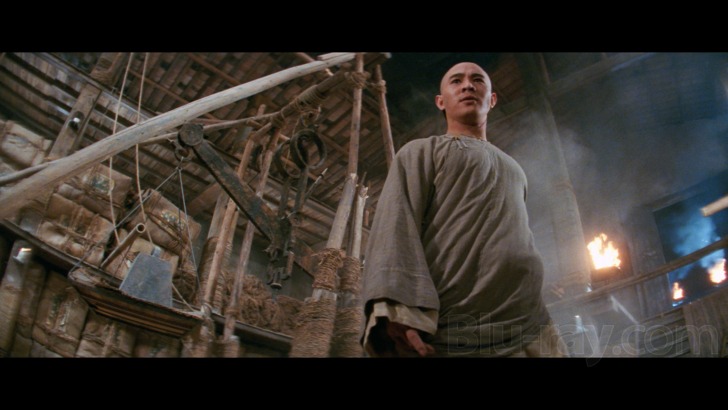
Once Upon a Time manages to make its way through a perhaps insane amount of exposition in a relatively brisk and straightforward manner, quickly and efficiently introducing both a number of characters who will continue to be involved in one way or another in the subsequent films, including of course Wong Hei-fung (Jet Li) himself, as well as his acolytes Bucktooth So (Jacky Cheung), Porky Wing (Kent Cheng), and Kai (Yuen Kam-fai), as well as Wong's ostensible love interest, Siu-kwan (Rosamund Kwan), who, per Chinese custom, is often referred to as "13th Aunt". But the film almost instantly introduces the idea that a 19th century China was besieged, both literally and figuratively, by outside powers, ostensibly in pursuit of “partnerships”, but quite often in the pursuit of colonial expansionism and hegemony over a “foreign” people. That in turn means that rather ironically it takes a relatively good while before this film credited with helping to reenergize a fading martial arts film industry actually really starts showing some martial arts.
Once the film does start offering some combat scenes, it ping pongs between the action elements and narrative interludes that supposedly offer character development (that may really be debatable when push comes to shove), but probably more saliently vignettes that tend to document the oppression of the Chinese, not just in their native country, but courtesy of some visitors, in such far flung places as the United States.
This first film in the series balances the action and comedy aspects arguably a bit better than some of its follow ups, and Tsui Hark contributes his typically peripatetic stylistic proclivities, with lots of skewed angles and warped perspectives courtesy of things like "fish eye" lenses.
Once Upon a Time in China Blu-ray Movie, Video Quality 
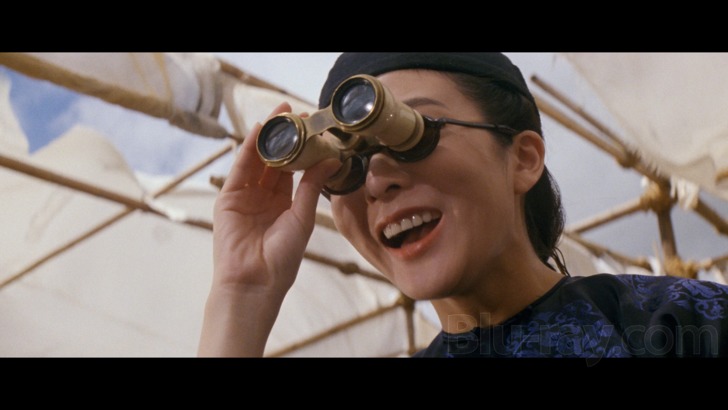
Once Upon a Time in China is presented on Blu-ray courtesy of Eureka! Entertainment with an AVC encoded 1080p transfer in 2.39:1. Eureka! provided only check discs for the purposes of this review, and so I'm not privy to any verbiage about the transfers that might be included in an insert booklet, but Eureka!'s site states that all of the transfers in this set are culled from new 4K restorations. This first films is arguably a little less consistent than the second and third, and my scores reflect those variances. There's nothing major to worry about, one way or the other, with generally great clarity and detail levels, but I found the color timing on this first one in particular often skewed slightly toward yellows, which can make things look slightly unnatural, with, for examples, a lot of reds veering pretty strongly toward orange territory (also pay attention to the blacks in the Golden Harvest masthead, which look pretty milky due to this tendency). The yellow undertone kind of ebbs and flows throughout the presentation, and there are certainly long swaths of the film where things look really nicely warm and well saturated, with a more naturalistic appearance. For example, the "theater" performance that begins at around 58:00 features some really bold primaries and reds that look at least somewhat less orangish. Hark really seems to like mist and haze in his framings, and this film features many such moments, which can add to the perception of softness, at least in backgrounds. His use of weird angles and lens can also detract from fine detail levels at times, and a few scenes can look just slightly out of focus, especially toward the sides of frames (see screenshot 3). Grain resolves naturally throughout the presentation, and I noticed no compression issues whatsoever, though a few darker scenes can look substantially grittier than the bulk of the presentation.
Once Upon a Time in China Blu-ray Movie, Audio Quality 
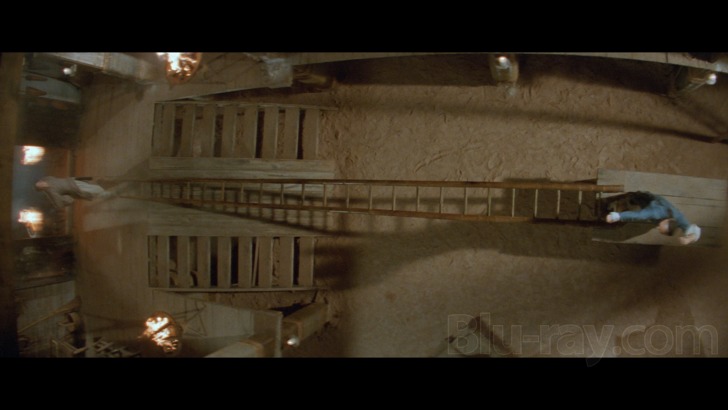
Once Upon a Time in China features Cantonese tracks in LPCM 1.0 and 2.0, a Mandarin track in LPCM 2.0, and an English dub in DTS-HD Master Audio 5.1. There are pluses and minuses to all of these tracks, and of course personal preferences will play into which each individual listener likes best. To my ears, the best sounding track overall was the Mandarin stereo track, one which offered the best general clarity and amplitude. The Cantonese mono track sounded slightly muffled in the midrange to me, and the stereo track just very occasionally sounded like it was on the verge of a bit of breakup in the higher registers (listen during the theme that plays under the "dance on the beach" at the film's opening). I personally wasn't overly fond of the English surround track, though it does open up the effects work in the fight scenes, and also spreads some of the music into the side and rear channels. That said, the surround track often sounded too diffused to my ears, and some of the dialogue in particular sounded pretty boxy, like it was recorded in a cave. It sounds to me like the Cantonese and Mandarin tracks occasionally use different music, which I found kind of interesting. The English track seems based on the Mandarin track in that regard.
Once Upon a Time in China Blu-ray Movie, Special Features and Extras 
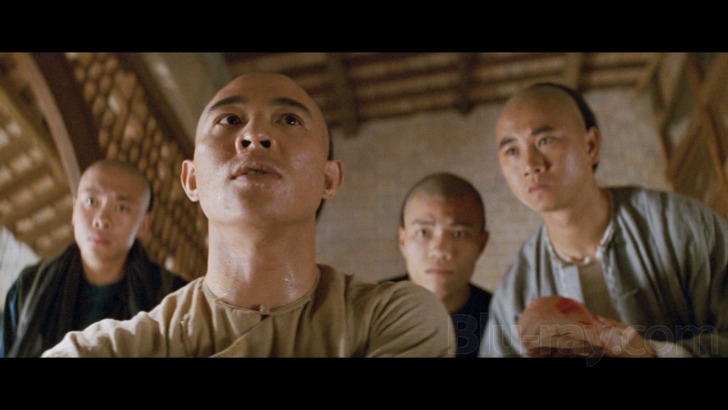
- Commentary by Mike Leeder and Arne Venema is the first of three excellent commentaries by Leeder and Venema that are supplements on the first three films in this set. These are filled with background information and general biographical data and the like, and reminded me a bit of some of the great commentaries done by the likes of Bey Logan used to do for some of the Dragon Dynasty and Shaw Brothers releases (among many others) back in the day .
- The Legend of Wong Fei-hung (HD; 12:59) is the first of a series of featurettes about the real life Wong that are offered on various discs of this series. This includes a lot of background information and interviews.
- Interview with Yen Shi-Kwan (HD; 7:50) is a really fun piece with Yen discussing his history with the Shaw Brothers. This has English voiceover translating Yen.
- Interview with Jet Li (HD; 10:35) starts with some scenes from Eastern Heroes and then moves on to some archival video of Jet Li discussing getting to know more about wu shu.
- Original Theatrical Trailer (HD; 4:31)
Once Upon a Time in China Blu-ray Movie, Overall Score and Recommendation 
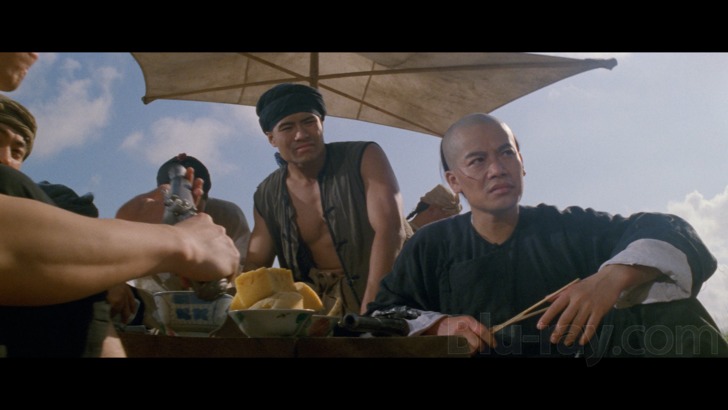
With a character as well known (at least to Chinese audiences, but arguably to a global audience as well) as Wong Fei-hung, it's easy to imagine that Once Upon a Time in China could have been a tired retread of previous outings. That "once upon a time" offers a perhaps salient clue to how Tsui Hark approaches the subject matter, and, while dark at times like a Grimm's Fairy Tale, Once Upon a Time in China is an engaging story told with style and even a bit of substance. Technical merits are generally solid, and the supplementary package appealing. Highly recommended.
Similar titles
Similar titles you might also like
(Still not reliable for this title)

Once Upon a Time in China II
黃飛鴻之二男兒當自強 / Wong fei hung II: Nam yee tung chi keung | Eureka Classics
1992

Once Upon a Time in China III
黃飛鴻之三獅王爭霸 / Wong fei hung III: Si wong jaang ba | Eureka Classics
1993

Once Upon a Time in China and America
黃飛鴻之西域雄獅 / Wong fei hung VI: Sai wik hung see | Eureka Classics
1997

True Legend
Su Qi-Er / The Legend of Beggar Su
2010

The 8 Diagram Pole Fighter
The Eight Diagram Pole Fighter / 五郎八卦棍 / Wǔ láng bā guŕ gůn | 88 Asia Collection #25
1984

Ip Man 4: The Finale
Yip Man 4
2019

The 36th Chamber of Shaolin
Master Killer / Shao Lin san shi liu fang / 少林三十六房
1978

Legend of the Fist
Legend of the Fist - The Return of Chen Zhen / Jing mo fung wan: Chen Zhen
2010

The Legend
方世玉 / The Legend of Fong Sai Yuk
1993

Ip Man 2
葉問2:宗師傳奇 | Yip Man 2 / Legend of the Grand Master
2010

13 Assassins
Jűsan-nin no shikaku
2010

Ip Man
葉問 / Yip Man
2008

The Grandmaster
一代宗師 / Yut doi jung si
2013

Come Drink with Me 4K
大醉俠 / Dŕ zuě xiá | 88 Asia Collection #24
1966

Bodyguards and Assassins
十月围城
2009

Dragon
2011

Hapkido
合氣道 / He qi dao / Lady Kung Fu | Eureka Classics
1972

Legend of the Black Scorpion
夜宴 / The Banquet / Ye Yan
2006

The Lost Bladesman
關雲長 / 关云长 / Guān Yúncháng
2011

Shaolin
2011